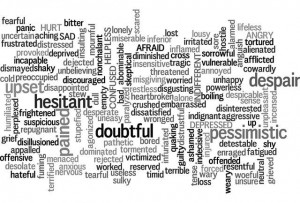Feminism is all the rage these days. I know because Hollywood tells me so.
Tina Fey and Amy Poehler turned the Golden Globes into a feminist event. And in her Oscar acceptance speech for Best Supporting Actor, Patricia Arquette called for pay equity while the likes of Meryl Streep, Jennifer Lopez and others in the audience whooped in agreement.
Social media and Twitter in particular, amplified Arquette’s words. Briefly, @pattyarquette was a hero to women everywhere … or at least to those with Internet access and a Twitter account.
Backstage, things fell apart when Arquette elaborated:
“And it’s time,” she said, “for all the women in America and all the men that love women, and all the gay people, and all the people of color that we’ve all fought for to fight for us now.”
The Twitter backlash was immediate.


Arquette neglected to consider many gay and coloured people are also women who suffer not only from gender discrimination, but from sexual and racial discrimination as well. She also failed to acknowledge the many contributions made to the women’s movement by coloured women and lesbians.
Arquette’s role as hero was short-lived, showing us (again!) that social media has both favourable and not-so-favourable consequences. While social media platforms communicate our message to the masses, they leave us vulnerable to criticism if the masses don’t like or agree with what we say.
Celebrities aren’t the only ones talking about women’s issues these days. Hashtag feminism was in full force last week in the lead-up to International Women’s Day.
YouTube launched #DearMe, encouraging women to upload videos offering advice and encouragement to their younger selves.
Always introduced the next iteration of #LikeaGirl with a new video showing girls doing the things they proudly do “like a girl.”
And the sensational Emma Watson, in a United Nations sanctioned initiative called #HeForShe, made herself available on Facebook to answer questions about the campaign and gender inequality.

We also saw legislators take up the cause, using International Women’s Day to launch new campaigns to end violence against women. Kathleen Wynne, the premier of Ontario, introduced a “road map to end sexual harassment,” including a multi-media awareness campaign using the hashtag #WhoWillYouHelp.
Are these programs, including social media, leading to substantive change in gender inequality?
According to a United Nations analysis released last week, many countries are making progress on several fronts:
- Maternal mortality is declining
- The percentage of women in government has nearly doubled
- More women are in the labour force
- Girls and boys are enrolled in primary school in equal numbers
- More women hold leadership positions
The same analysis reports that violence against women worldwide is still alarmingly high. There are also new types of violence, some of which emerged on social media. Last month I wrote about feminist writer Lindy West and her encounter with online trolls resulting from her stance on rape culture in stand-up comedy.
Of course, we can’t credit social media with the state of women’s rights today, positive or negative. Nevertheless, I believe social media is helping to raise awareness and encourage discussion, both of which will ultimately lead to changing attitudes—and actions—around gender inequality.
I’ll give the last word to Ernestine’s, a local shelter in Toronto that has provided support and accommodation for more than 30 years to women and children escaping violence. According to their annual progress report, over the last 2 years there’s been a shift in the conversation around violence against women.
High profile cases of violence and rape (including Ray Rice, Bill Cosby and Jian Ghomeshi), along with subsequent media attention and overwhelming condemnation of abuse, mean the topic is no longer taboo.
According to Ernestine’s report, “what was once unacknowledged—or spoken of in whispers or euphemisms when it was discussed at all—has become a topic of global interest and reach.”
Social media facilitates these conversations. Even if we don’t like what we hear, or the people having the dialogue don’t agree with one another, at least the discussion exists.
We need more than talk to change gender inequality. But we can’t underestimate the power of conversation. If we’re talking about violence against women, or any other form of gender inequality, eventually things will change.
(293)










